nones

The issue isn’t that God does not have power; the issue seems to be more that we do not use the power that God gave to us. While we profess to love God and God’s son Jesus, we are all too ready to dismiss what God gave us in, with, and through the life, death, burial, and resurrection of Jesus. While we say we are Christian, we bypass too often the words of Jesus and latch onto other parts of the Bible, most often the words of Paul. While Paul’s writings have their own power, they do not have the power of Jesus’ words, nor do they carry with them the promise of the Holy Spirit, which does have the power to sustain and strengthen us.
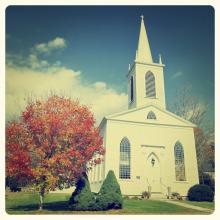
The recently released Pew Research Center Report has revealed that Christianity within the United States is on the decline. Christians are freaking out and the fear mongering has begun — many seeing it as an apocalyptic sign of the moral downfall of our secular society coinciding with a theological weakening caused by “liberalism.”
Everyone seems to have an explanation of the data, and among Christians, the infighting has already begun, with most denominations rationalizing their growth, decline, or stagnancy by offering the same explanation: We’re theologically sound and remaining faithful to God while everyone else is getting it wrong.
What Christians must understand — and accept — about these statistics is that religious data about a country doesn’t accurately reflect its corporate actions pertaining to following Christ.
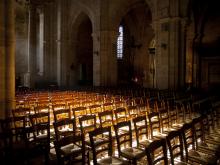
A new survey shows in stark relief that what some are calling the Great Decline of religion in America continues: Since 2012, the U.S. has about 7.5 million more Americans who are no longer active in religion.
Last week, the 2014 General Social Survey was released. The GSS is the gold standard for sociological surveys. Funded by the National Science Foundation, this multimillion-dollar study gives us the most accurate data on American society — including religion.
(An important point to remember as you see the data: Each percentage point increase represents a growth of 2.5 million adults. So a 3-point rise in secularity, for example, means that about 7.5 million people left religion since 2012.)

It snuck up this year, as though I’d almost forgotten about it until I saw friends in another time zone posting Mardi Gras pictures. Mardi Gras is this week? I thought. That means Lent begins this week?! Maybe it’s because I don’t go to church right now, or because I’m not in a spiritual community like I was before I moved cities. But for whatever reason, it came fast and unexpected, and something inside won’t let me pass it up. As much as I disagree with some of the traditional teachings about Easter and various interpretations of why Jesus was crucified, I have always had a penchant for Lent.
Lent is a time that draws out the heart’s ability to draw nigh to your Creator. Of drawing closer to God, to others, to the wide open world around us. A time for spiritual reflection and inner examination. A time to pause. A time for simplicity. A 40-day season containing strong, beautiful symbolism. Death from life. Life from death. The two are inseparable. Hope is reborn, recycled out of crushed pain and heartache. The timing of this season enhances the meaning all the more to me, as we begin Lent in the waning winter, in which it is still snowing as I write this. But we end Lent well into spring.

Reading religion surveys can seem like confronting the Tower of Babel: stacked questions, confusing terms, unscientific methodology.
It gets even crazier when results are contradictory. How does that happen?
Some surveys lean like the Tower of Pisa
The Pledge of Allegiance is a perfect example.
There’s almost always a flap over how many Americans do — or don’t — want the words “under God” kicked out of the Pledge of Allegiance. Indeed, on Nov. 19 a court in Monmouth, N.J., will hear the case of the American Humanist Association battling the Matawan-Aberdeen Regional School District to have schools edit out mention of God.
The humanists claim 34 percent of Americans agree with their view. But, wait. What about a survey conducted earlier this year by LifeWay Research, a Christian research agency? It found that only 8 percent would cut God from the Pledge.
Why four times the difference? Look to the poll language.
LifeWay asked: “Should the words ‘under God’ be removed from or remain in the Pledge of Allegiance to the United States of America?” That’s a straight-up question with no preface.
The humanists’ survey, however, began with a bit of pointed Pledge history — before getting to the (loaded) question:
“For its first 62 years, the Pledge of Allegiance did not include the phrase ‘under God.’ During the Cold War, in 1954, the phrase ‘one nation, indivisible … ‘ was changed to read ‘one nation, under God, indivisible … ‘. Some people feel this phrase in our national pledge should focus on unity rather than religion.
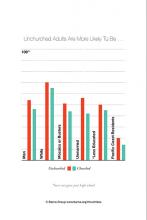
If you’re dismayed that one in five Americans (20 percent) are “nones” — people who claim no particular religious identity — brace yourself.
How does 38 percent sound?
That’s what religion researcher David Kinnaman calculates when he adds “the unchurched, the never-churched and the skeptics” to the nones.
He calls his new category “churchless,” the same title Kinnaman has given his new book. By his count, roughly four in 10 people living in the continental United States are actually “post-Christian” and “essentially secular in belief and practice.”
If asked, the “churchless” would likely check the “Christian” box on a survey, even though they may not have darkened the door of a church in years.
Kinnaman, president of the California-based Barna Group, slides them into this new category based on 15 measures of identity, belief and practice in more than 23,000 interviews in 20 surveys.
The research looked at church worship attendance and participation, views about the Bible, God and Jesus, and more to see whether folks were actually tied to Christian life in a meaningful way or tied more by habit or personal history.



Today the world celebrates Pope Francis’ first year. Notice I didn’t say the church is celebrating, but the world. The pope has graced the covers of every magazine from TIME to Rolling Stone over the past year. People all over the world are delighted by the breath of fresh air he has brought. His popularity has moved beyond Catholics to Christians of all kinds, believers from other faith traditions, agnostics, and the “nones,” who are very drawn to this pope who emphasizes love and simple living.
But the pope said last week that he is not a “ superman” and does not want to be a celebrity. He is just trying to talk and live like Jesus, a point he makes repeatedly to shrug off his media darling standing. From the moment he took the name Francis, he made clear his, and thus the church’s priorities: the poor, peace, and the creation. Francis is now challenging the most powerful people and places in the world, as well as a popular culture that mostly asks how we can serve ourselves.
Pope Francis is right: it is not about him; it’s about the Christ he follows. Everything Francis is saying and doing is aimed at pressing this question: Are Christians going to follow Jesus or not? That should be the question on the first anniversary of this new pope. Are we Christians ready and willing to follow Jesus? How can we then serve the world?

In recent surveys, the religious “nones” — as in, “none of the above” — appear to lead in the faith marketplace. In fact, “none” could soon be the dominant label U.S. adults pick when asked to describe their religious identity.
And, researchers say, this is already making nones’ attitudes and opinions less predictably liberal on social issues.

I get asked questions sometimes that I feel are useful for a larger audience to consider and discuss. One such question was submitted to me by a reader a while back, which echoes the sentiments within many other similar questions I’ve received. Here’s the essence at the heart of those questions.
What do I do if I’m not sure what I believe?
First of all, don’t freak out. Most of the book of Ecclesiastes in the Old Testament is about a priest suffering a crisis of faith. And though some argue it was more a fulfillment of prophecy (quoting a psalm) rather than a personal cry of distress, it’s hard not to feel Jesus’ own existential suffering when he cries out from the cross for a God who seems to be missing.

A couple years ago, a survey found that one in five Americans don’t identify with any religion. For Americans under 30, the number was far higher – more like one third. This report is being cited constantly throughout the religious-nonprofit world. In many quarters, there seems to be a deep sense of shock at the decline in religious membership.
Me? I’m not surprised at all. What does surprise me is our failure to see that affiliation with a traditional, God-centered religion is no longer the primary way that many Americans express their deeply rooted need for faith. We humans are relentlessly religious animals, and post-modern America is no exception. We’re just embracing a different kind of faith.

Cynthia Bourgeault explains how we can both seek social justice and do justice to our souls.
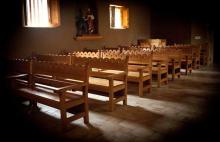
Merry what? Just in time for Christmas, new statistics show “no religion is the new religion” in Great Britain, according to a study released Monday.
The study, by Westminster Faith Debates, finds 38 percent adults in Great Britain, and 48 percent of those ages 18 to 29, checked no religion in online surveys conducted in January and June by YouGov.
These numbers fall midway between the findings of two other British studies that both show a trend away from the pews.
FOR CENTURIES Christians have pondered what it means to be created in the image of God. Throughout my own academic career, I’ve been haunted by the mystery of Genesis 1:27: “God created humanity in God’s own image, in the divine image God created them, male and female God created them” (CEB).
What does this passage reveal about us, and consequently, what does it reveal about God? The second half of the passage is equally contentious and challenging. Does “male and female God created them” imply that men and women reflect the image of God equally?
While Genesis 2 to 3, with its narrative of sin and betrayal, is captivating, there is something about the simplicity, mystery, and implications of Genesis 1:27 that resonates even today. I would argue that Genesis 1:27 is the foundation of an egalitarian anthropology where male and female are at the center of theological reflection, where they reflect the image of God without hierarchy or preference. The existence of distinctive genders in humanity does not imply any sort of sexuality within God. Instead, the metaphor retains the unknowability and mystery of God. It reminds us that there are similarities and great differences between the created and Creator. The metaphor “image of God” both reveals and conceals something about the nature of God—and the nature of humanity.
Genesis 1:27 has been a source of inspiration, debate, and controversy throughout the history of Christianity. The church fathers (writing between 150 and 500 C.E.) often implied that women must negate their very womanhood in order to reflect their creation in God’s image. These male writers in the early church viewed female bodies as an impediment to reflecting the image of God. Augustine of Hippo argued that although women spiritually share the image of God, they do soin spiteoftheir bodies—women’s bodies corrupt and diminish their ability to reflect the image of God. In this thinking, women reflect a distorted image; we are inherently deficient.
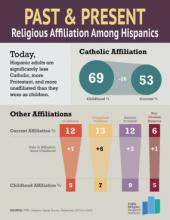
The number of Hispanic-Americans who say they adhere to no religion is growing and now rivals the number of Hispanic evangelicals, a new study has found.
The share of Hispanics living in the U.S. who say they are atheist, agnostic, or have no religious affiliation has reached 12 percent, according to the 2013 Hispanic Values Survey conducted by the Public Religion Research Institute. That is double the rate reported in 1990 by the American Religious Identification Survey.
Researchers say Hispanic “nones” are now statistically equal to the number of U.S. Hispanic evangelical Protestants — 13 percent — and warn of a religious divide in the Hispanic community that will be felt for decades to come.

Reviews of the new hit movie Gravity note that it’s an unusually fine science fiction film. What they don’t mention is that the main character represents an increasingly common theme in American religion: The spiritual “none of the above.”
Yes, the special effects are splendid. And I’ll take the word of astronauts who say the visuals capture amazingly well what it’s like to work in the microgravity of near-Earth orbit.
But there are moments where spiritual and philosophical themes take center stage.
(Spoiler alert: I’ll give no more away than I’ve seen in most reviews, but if you really want to know nothing about the movie, see it first.)

They’re rarely at worship services and indifferent to doctrine. And they’re surprisingly fuzzy on Jesus.
These are the Jewish Americans sketched in a new Pew Research Center survey, 62 percent of whom said Jewishness is largely about culture or ancestry and just 15 percent who said it’s about religious belief.
But it’s not just Jews. It’s a phenomenon among U.S. Christians, too.
Meet the “Nominals” — people who claim a religious identity but may live it in name only.